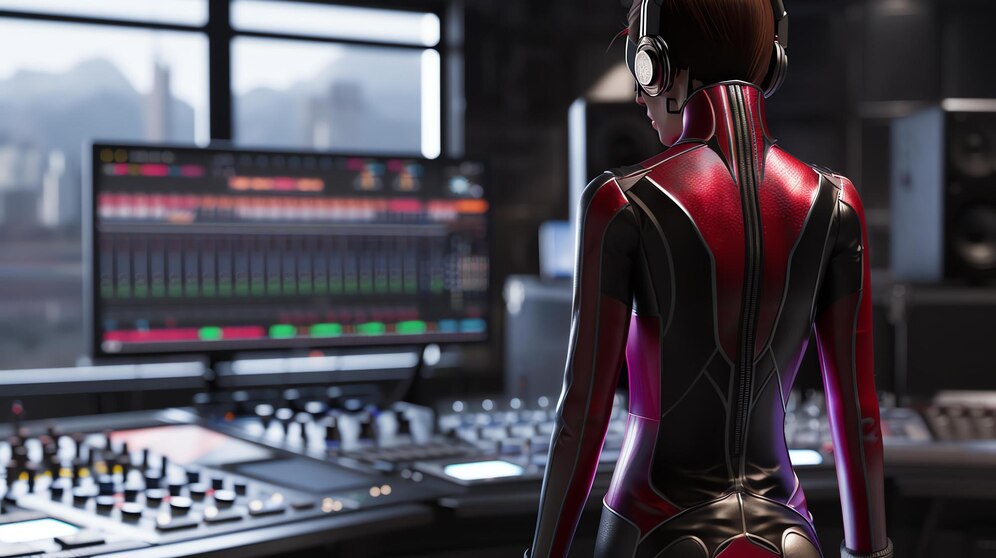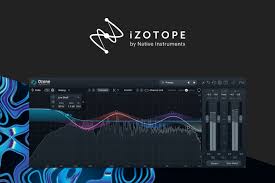Originally posted on June 22, 2024 @ 11:00 pm
Introduction to AI in Sound Engineering

AI is poised to revolutionise sound engineering, offering tools that enhance creativity, improve efficiency, and democratise access to high-quality production.
Today, AI-driven tools and technologies are the best shot in transforming how sound is created, mixed, and mastered digitally, leading to unprecedented levels of efficiency, creativity, and precision in our sound and music production.
Therefore, our intention is to help you explore the needs on the future of digitalised mix through the lens of Artificial Intelligence (AI), pointing to the followings;
- Its Historical context with importance of maintaining the human element
- Relevance of AI in sound and music production
- Transformative potentials of AI in sound engineering
- Resources for effective deployment of AI in sound and music production is explained
- Examples of AI Solutions that is frequently used in Live Concerts and Events
- Practical Tips to implement AI solutions in your sound and music production; Simpler than you could think
- My Thought on AI in sound engineering
However, if you desire to push the boundaries of what is possible in advanced digitalised mix by powering AI tools and models, exploring the Resources for Effective Deployment of AI in sound engineering should be your goal.
But I am quite sure you may not grab all the idea from this article unless you first visit our previous article on Sound Engineering: Tips for mastering digitalized mix which will broaden your knowledge on the need and beauty of a digital mix.
Its Historical Context in Sound Engineering
The journey of sound and music production has been marked by significant technological advancements that have revolutionised the industry.
From the era of analog recording to the digital revolution and now the integration of AI, each of these phases has brought unique innovations in its own way.
Understanding this historical context is crucial in appreciating the current landscape [AI] and maintaining the essential human element [that is, despite its digital capabilities, successful production still required human creativity and judgment] in music production.
- The Analog process which was highly manual, requiring skilled engineers and musicians to achieve the desired sound with integral collaboration often working in the studio.
- Next, the introduction of digital sound and music production brought about a paradigm shift. Digital Audio Workstations (DAWs) like Pro Tools emerged and some other tools
The Digital technology allowed for precise editing, layering, and manipulation of sound.
- Now, the emergence of AI technologies began to be integrated into music production tools and processes. BUT HOW?
- AI-driven plugins and software gives room for advanced functionalities such as automated mixing, mastering, and sound design.
- Musicians, sound engineers and music producers are adapting to the new tools, incorporating digital techniques while striving to retain the organic feel of music.
Relevance of AI in Sound and Music Production
First, it is necessary to open up a broader perspective to you our reader on the future of sound engineering with AI, making it highly relevant and informative thereby delving into the latest trends and technologies
Some of its unwavering relevance are;
- Contemporary theme of digitalisation that provide insights into the cutting-edge advancements that are transforming the field of sound engineering
- With AI’s tools, there is so much enhancement in sound and music production for mastering digitalised mixes
- AI opens new possibilities for artists and producers e.g. Amper Music platforms that sets parameters, aiding a more robust creative process for all
- AI allows musicians and sound engineers to focus more on the artistic aspects of their work.
- Its impact on the music industry will spontaneously grow, fostering innovation and expanding the horizons to more advanced digital productions.
- AI helps in generating chord progressions, melodies, and harmonies, expanding creative possibilities.
6 AI’s Transformative Potential in Sound and Music Production
- Automated audio editing and correction.
- AI can assist in live sound settings, adapting to acoustical changes and optimising audio in real-time.
- AI can analyze and adjust levels ensuring a polished mix with little of human intervention
- AI is used in interactive art installations to process and generate sound in response to audience movement and interaction
- It is accessible to novice producers, enabling high-quality production with less technical expertise.
- Preservation of audio quality without degradation over time.
5 Major Resources for Effective Deployment of AI in Sound and Music Production
By leveraging these resources to be discussed here, musicians, sound engineers and music producers can effectively deploy AI in sound and music production, enhancing creativity, automation, and quality in the industry. The resources are as follows;
- AI Frameworks and Libraries: Are software tools that provide developers with pre-built functions and structures.
They efficiently build, train, and deploy artificial intelligence models for various applications. E.g TensorFlow, PyTorch, Keras
2. Datasets and Data Sources: They are audio recordings and associated metadata used to train AI models for tasks such as audio classification, sound synthesis, and music generation. E.g. MIDI files
3. Cloud Computing Services: Available in the delivering of computing resources like sound and music software, AI tools over the internet.
E.g. AWS AI services, Google cloud AI platform, Microsoft Azure AI.
4. AI-powered Tools and Software: Application programs equipped with AI capabilities, designed to automate tasks, perform complex operations like music composition.
E.g Open AI Jukebox, LANDR, AIVA
5. Community and Educational Resources: These are necessary for integrating AI in sound engineering.
Why?
They provide essential knowledge, collaborative opportunities, skill development, and access to tools and ethical guidelines, fostering innovation and effective application of AI technologies.
E.g. AI and music conferences (ISMIR), online courses and tutorials (Coursera, edX, Udacity), GitHub repositories
Moreover, it is been proven that one of the primary reasons for integrating AI into your sound and music production is to transform sound engineering, thereby making complex tasks more efficient and opening up new creative possibilities.
SOME Examples of AI Solutions being used in Live Concerts and Events
- Google’s WaveNet developed by DeepMind – A speech and audio recognition software for identifying, isolating and processing speech elements.

- OpenAI’s MuseNet – An AI model that helps generate music in various styles and instruments. It therefore uses deep learning to compose original pieces that is generated

- iZotope’s Ozone – A Recognized AI-powered mastering software. It automatically analyses audio tracks and suggest adjustments to equalization, compression, and other effects to achieve a professionally polished sound mix

Practical Tips – How to implement AI in sound engineering.
- Input and Analysis: The audio file is input into the AI system, which performs speech recognition and source separation to identify and isolate different elements.
- Processing: The isolated elements are processed individually with AI-driven tools for noise reduction, EQ, and compression.
- Mixing: The processed elements are recombined, with AI providing real-time adjustments to maintain balance and clarity.
- Output: The final mix is exported with metadata tags generated by the AI for easy reference and further processing.
MY THOUGHT ON AI IN SOUND ENGINEERING
By understanding and embracing these technologies, sound engineers can leverage on AI, the faster your accomplishment, fulfillment and achievements thereby ensuring that you stay at the forefront of an ever-evolving industry.
The level of my fascination with your work matches your own enthusiasm. Your sketch is elegant, and the authored material is impressive. Nevertheless, you appear concerned about the prospect of heading in a direction that could be seen as dubious. I agree that you’ll be able to address this concern promptly.
Great Article bro, situs slot gacor bet 200
Great Article bro thanks, situs slot gacor maxwin
Great Article bro thanks, situs slot gacor mudah maxwin
beylikdüzü elektrikçi SEO ile Google sıralamalarında yükselmek harika bir duygu. Profesyonel destek almak şart!
very informative articles or reviews at this time.
Pretty! This has been a really wonderful post. Many thanks for providing these details.
I like the efforts you have put in this, regards for all the great content.
This was beautiful Admin. Thank you for your reflections.
I really like reading through a post that can make men and women think. Also, thank you for allowing me to comment!
Pretty! This has been a really wonderful post. Many thanks for providing these details.
Pretty! This has been a really wonderful post. Many thanks for providing these details.
This was beautiful Admin. Thank you for your reflections.
There is definately a lot to find out about this subject. I like all the points you made
Technoob You’re so awesome! I don’t believe I have read a single thing like that before. So great to find someone with some original thoughts on this topic. Really.. thank you for starting this up. This website is something that is needed on the internet, someone with a little originality!
“This post has helped me solve my issue, thanks a ton!”
Thank you
Sportsurge I appreciate you sharing this blog post. Thanks Again. Cool.
Thank you
“Amazing post, keep up the good work!”
Normally I do not read article on blogs however I would like to say that this writeup very forced me to try and do so Your writing style has been amazed me Thanks quite great post
thank you
What i do not realize is in fact how you are no longer actually much more wellfavored than you might be right now Youre very intelligent You recognize thus considerably in relation to this topic made me in my view believe it from numerous numerous angles Its like men and women are not fascinated until it is one thing to do with Lady gaga Your own stuffs excellent All the time handle it up
hiI like your writing so much share we be in contact more approximately your article on AOL I need a specialist in this area to resolve my problem Maybe that is you Looking ahead to see you
Hey there You have done a fantastic job I will certainly digg it and personally recommend to my friends Im confident theyll be benefited from this site
Noodlemagazine Very well presented. Every quote was awesome and thanks for sharing the content. Keep sharing and keep motivating others.
thank you
“Your writing style is engaging and clear, love it!”
Thank you
“This post has helped me solve my issue, thanks a ton!”
Noodlemagazine Awesome! Its genuinely remarkable post, I have got much clear idea regarding from this post . Noodlemagazine
Please help us re-subscribe for new post update. We lost the previous subscribers including you from our database. Thanks
Mat6tube Great post! We’ll be linking to this particularly excellent article on our site. Keep up the amazing writing
FlixHQ Exceptionally useful articles or reviews currently
You made some first rate factors there. I seemed on the internet for the issue and found most individuals will go together with with your website.
Thank you, kindly share the link in your respective platform and bookmark our site for future post
Your article helped me a lot, is there any more related content? Thanks!
Your article helped me a lot, is there any more related content? Thanks!
I really like your writing style, good information, regards for putting up : D.
Thanks for sharing. I read many of your blog posts, cool, your blog is very good. https://accounts.binance.com/en-IN/register?ref=UM6SMJM3
Thanks for helping out, superb info. “If at first you don’t succeed, find out if the loser gets anything.” by Bill Lyon.